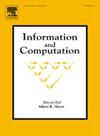Unbounded quantum-classical separation in sample complexity for sphere center finding
IF 1
4区 计算机科学
Q3 COMPUTER SCIENCE, THEORY & METHODS
引用次数: 0
Abstract
Fast quantum algorithms can solve important computational problems more efficiently than classical algorithms. However, little is known about whether quantum computing can speed up solving geometric problems. This article explores quantum advantages for the problem of finding the center of a sphere in vector spaces over finite fields, given samples of random points on the sphere. We prove that any classical algorithm for this task requires approximately as many samples as the dimension of the vector space, by a reduction to an old and basic algebraic result—Warning's second theorem. On the other hand, we propose a quantum algorithm based on quantum walks that needs only a constant number of samples to find the center. Thus, an unbounded quantum advantage is revealed for a natural and intuitive geometric problem, which highlights the power of quantum computing in solving geometric problems.
无界量子经典分离在球体中心寻找中的样本复杂度
快速量子算法可以比经典算法更有效地解决重要的计算问题。然而,人们对量子计算能否加速解决几何问题知之甚少。本文探讨了在有限域上的向量空间中寻找球体中心问题的量子优势,给出了球体上随机点的样本。我们通过一个古老而基本的代数结果——warning的第二定理,证明了任何经典算法对于这一任务所需要的样本数大约与向量空间的维数一样多。另一方面,我们提出了一种基于量子行走的量子算法,它只需要常数个样本就可以找到中心。从而揭示了一个自然而直观的几何问题的无界量子优势,凸显了量子计算在解决几何问题方面的强大能力。
本文章由计算机程序翻译,如有差异,请以英文原文为准。
求助全文
约1分钟内获得全文
求助全文
来源期刊

Information and Computation
工程技术-计算机:理论方法
CiteScore
2.30
自引率
0.00%
发文量
119
审稿时长
140 days
期刊介绍:
Information and Computation welcomes original papers in all areas of theoretical computer science and computational applications of information theory. Survey articles of exceptional quality will also be considered. Particularly welcome are papers contributing new results in active theoretical areas such as
-Biological computation and computational biology-
Computational complexity-
Computer theorem-proving-
Concurrency and distributed process theory-
Cryptographic theory-
Data base theory-
Decision problems in logic-
Design and analysis of algorithms-
Discrete optimization and mathematical programming-
Inductive inference and learning theory-
Logic & constraint programming-
Program verification & model checking-
Probabilistic & Quantum computation-
Semantics of programming languages-
Symbolic computation, lambda calculus, and rewriting systems-
Types and typechecking
 求助内容:
求助内容: 应助结果提醒方式:
应助结果提醒方式:


